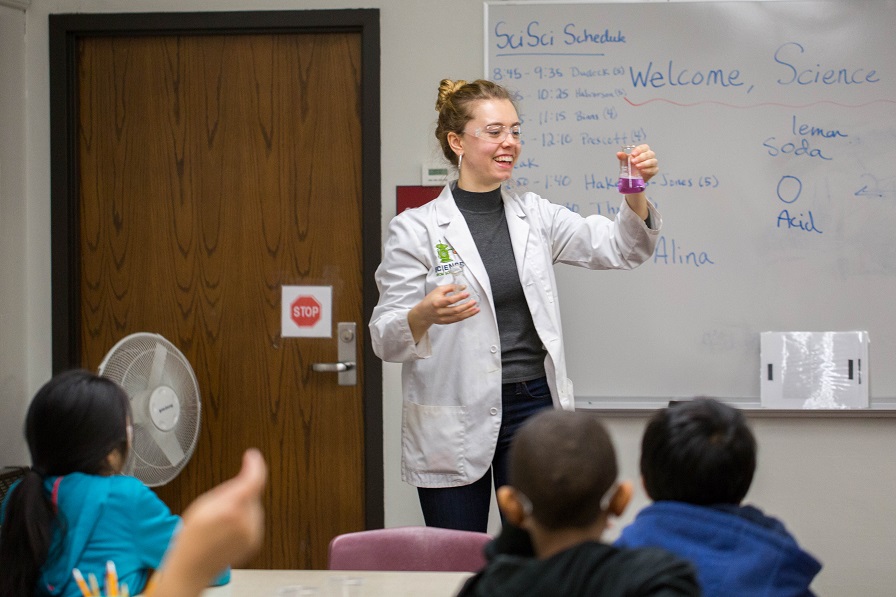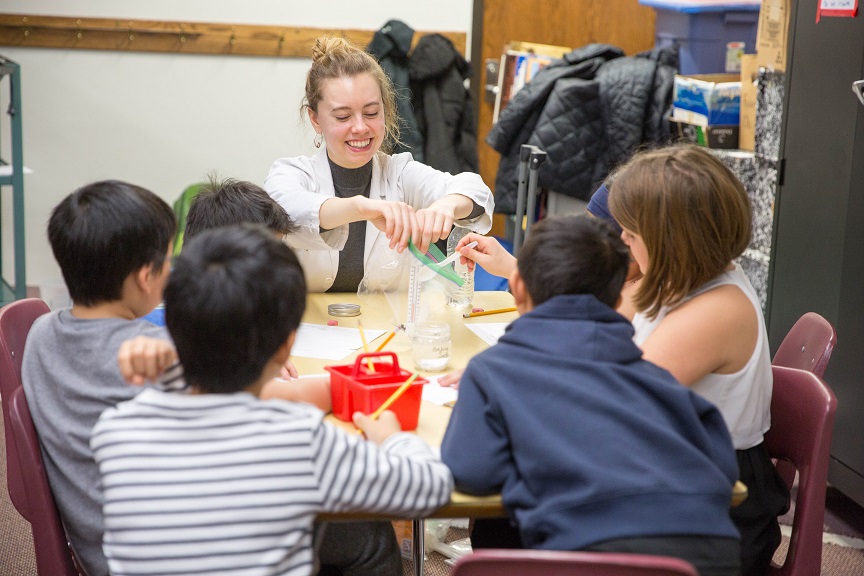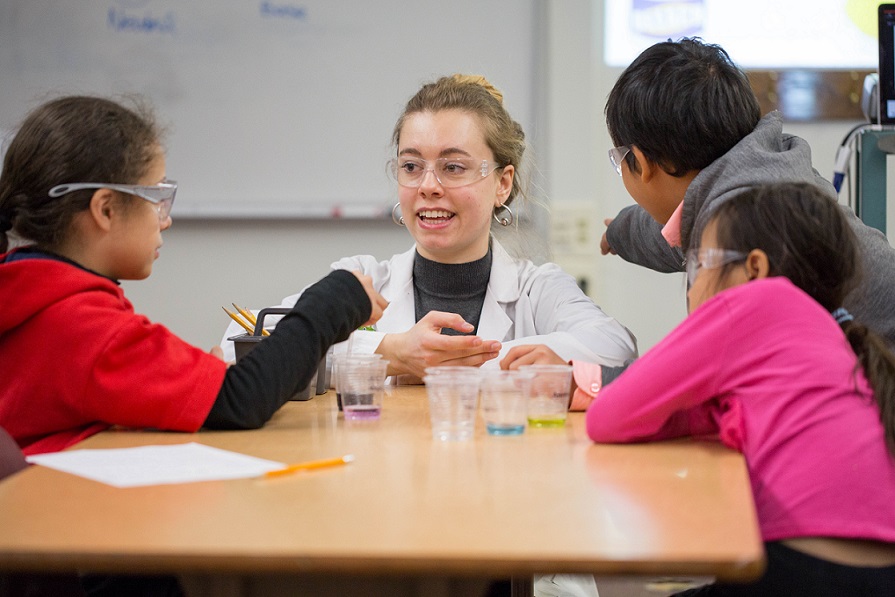
Science From Scientists: Making Science Cool for Kids
Science From Scientists has an uphill battle, making science attractive to students who tend to think of STEM studies as somehow uncool. But make science attractive we must, because we desperately need scientists to solve seemingly unsolvable world problems and to advance medical research. If we don’t make them love science, how will we get kids to become scientists?
We are impressed that Science From Scientists is indeed making science cool to the kids lucky enough to have access to what they have on offer. Which is why we were so very glad to give a helping hand to this amazing organization with one of our small grants.
We see it as an investment in all our futures.
What is Science From Scientists doing exactly, and might it be possible to replicate their success? We spoke with Chief Operations Officer and Science From Scientists Instructor Amanda Schutt, to learn more:
Kars4Kids: You put kids in the hands of “real, charismatic scientists.” Why must they be “charismatic?” Isn’t it enough that kids learn from real scientists?
Amanda Schutt: Our goal is to reach every student in our classes with our message. It can be a transition or learning experience going from being or studying to be a scientist, engineer or tech professional to teaching STEM topics to students in grades 3-8. It takes an outgoing personality, patience, passion and ability to motivate each student to find one or two topics in STEM to pursue further. This is what we seek when we recruit our instructors.
Many of the students we serve have never met a real scientist before. Because students see our instructors over a long period of time and get to know them, they realize these professionals are regular people, just like them, and perhaps THEY (the student) could be a scientist too! Our instructors not only serve as positive role models but become mentors and guides throughout the school year.
We train our instructors. We teach them how to manage classroom behavior; techniques to draw students out so they will participate in each lesson plan; and to successfully impart the Information and message of each lesson. It is imperative that our instructors are not just educationally qualified, but are able to touch each student and motivate them through each lesson plan.
Kars4Kids: Can you share about some of the scientists who work with your participants? What made them special and engaging? What exactly did they teach?
Amanda Schutt: All of our instructional staff have obtained or are enrolled in advanced degree programs in STEM, or they have comparable industry experience. We require this because we want individuals who made the choice to extensively and authentically pursue STEM because they are passionate, curious, lifelong-learning people. These are the kinds of role models we place in schools: biomedical engineers who made movies about invasive cancer cells in living brain tissue; environmental scientists who studied contaminants in seafood; entomologists who studied pesticide resistance genes in insects; physicists who studied experimental light detectors; computer scientists who study storage and access of huge datasets; neuroscientists who studied drug addiction medications; astronomers who study how galaxies evolve; engineers who build micro aerial vehicles, and doctors who study how to prevent deadly allergic reactions.
Just imagine being in elementary school and these incredible people come to your class every other week to listen to your questions, do fun activities, and talk about the fact that they, even as an adult, are still learning science too! These are positive role models who students will admire and want to emulate in life and career.

Kars4Kids: Your vision statement states in part, that the goal of Science from Scientists is filling the workforce pipeline with talented, competent individuals. Can you elaborate on why that’s a primary goal?
Amanda Schutt: There are currently 22 million unfilled STEM jobs – in all professions, at all levels – in the U.S. due to lack of trained, competent workers and leadership. What will this number be in ten years if we don’t motivate more students to explore the wonders and potential of STEM? We’re already concerned that there won’t be enough people with the STEM content knowledge and skills we need to address the future problems at our doorstep now (climate change, antibiotic resistance, lack of clean water and sufficient food) and to be in a position to advance us as a global society (explore Mars, cure cancer, eradicate curable diseases, and more.) We need dynamic thinkers and doers, who make connections across disciplines; who are facile with technology; who know how to structure testable questions and experiments; and understand how to interpret data to draw conclusions.
Many of our supporters, STEM companies with their eyes on who will be their future workforce, tell us that it’s also the interpersonal skills that need cultivation – teamwork, perseverance, collaboration, and communication. So we embed all of these experiences into each of our programs so every child we work with gets practice, builds confidence, and buoys interest in a future where they help people, solve problems, make cool inventions, and have fun.
Kars4Kids: Can you tell us a bit about ISMB? How do schools find out about your services?
Amanda Schutt: Science from Scientists’ In-School Module-Based Science, Technology, Engineering, and Math (STEM) program is a during-school, classroom-based curricular supplement. We partner with schools who reach out to us (we currently have a waiting list!)
Each school that joins the program gets assigned two of our staff of real, charismatic STEM professionals for the entire school year. Those two staff will be on-site at the school for 18 full days, every other week, seeing back-to-back classes of students all day. Each visit, our staff brings one of our 100+ stand-alone “modular” lessons with hands-on activities selected by the classroom teacher to complement or extend what they’re working on. We’ve developed each of these lessons based on state and national science standards with the added lens of a team of professionals who review and edit the lessons and their materials for common misconceptions and accurate explanations.
Teachers love the modular aspect of our program; they have total flexibility to pick topics they need the most with the support of our staff in the classroom to bring all the materials and help carry out experiments no matter how complex the set-up or messy the clean-up. We’ve tracked how well the program addresses student interest and competence in STEM – quiz scores show a 16-percentage point improvement and surveys show 70% of students being interested in becoming a scientist, engineer, or technical professional in the future (compared to national interest levels of ~48%.)
We accept public, charter, and private schools into the program and we currently serve Greater Boston & Greater Worcester, Massachusetts; the Bay Area in California; and the Twin Cities in Minnesota. Interested principals or teachers can contact us at info@sciencefromscientists.org.

Kars4Kids: Would you please tell us about your ACCESS program, and in particular, can you describe a typical ACCESS field trip?
Amanda Schutt: ACCESS is a program Science from Scientists offers in collaboration with the Massachusetts Biotechnology Education Foundation (MassBioEd) the education support 501c3 arm of the Massachusetts Biotechnology Council. Our goal is to engage teachers and inspire students to build a pathway to career opportunities in the life sciences sector. We provide a vertically-aligned curricular program with classroom-friendly labs that span life sciences topics from Grades 7-10 such as photosynthesis/respiration and genetics. We provide teachers with professional development workshops, all of the equipment, materials, and reagents needed, as well as live in-class support when they go to implement these labs. The equipment, lab skills, and scientific content we introduce at the middle school level then spirals up to high school where students and their teachers are prepared to conduct their own authentic, inquiry-based experiments.
We connect these classroom experiences to career by inviting guest speakers into schools to lead additional hands-on activities and by taking students on field trips to corporate offices to meet all of the different kinds of people and roles in the biotechnology space. On a field trip last spring, a student spent two hours talking to a patent lawyer over pizza about what her day-to-day job was like. On a tour of a lab, another student saw a piece of equipment he recognized from the classroom, and with immense pride, raised his hand when the guide asked the group if they could identify it.
Kars4Kids: For those of us not lucky enough to see the SpectacuLAB, can you tell us a bit about it?
Amanda Schutt: SpectacuLAB was a live, 20-minute interactive show that ran daily for 14 months in Innoventions at Epcot in Walt Disney World. The show, presented by Murata, featured several of their sensor technologies and how they’re used in the real world. Guests were invited on stage to participate in games and challenges using barometric and pressure sensors. Actual Science from Scientists staff were part of the show – as themselves! – giving young guests a chance to ask them questions about their research and expertise.

Kars4Kids: How many kids are in your summer program? Why is it “screen free?” Is that difficult to enforce?
Amanda Schutt: We typically serve about 500 students annually in our various summer programs across the country, which include week-long themed experiences on forensic science or ecology or kitchen chemistry. What we offer is an extension of our in-classroom program – the same trained scientist-instructors and the same rigor of the engaging, hands-on activities, just in a new setting unconstrained by school day bell schedules. There are some great online educational science videos and games out there, but based on feedback from parents and teachers, that screen-based STEM experience is something kids can (and do already) access on their own time and devices, if available to them. What’s missing is the tactile, unmanufactured experience, the open-endedness of an experiment that you can’t fast forward through, and the challenges and joys of unscripted problem solving and brainstorming with peers live in the moment, and learning from an actual scientist, engineer or tech professional. It’s not hard at all to skip the screens when you see how much fun you can have with your hands.
Kars4Kids: What’s next for Science from Scientists?
Amanda Schutt: Schools request us back year after year, and we have a working wait list of schools that are waiting for our program to come to their town or state so we certainly expect to serve additional schools in each of our core regions, and new states as well. We’re collaborating with non-profits, colleges, and universities to develop unique programming outside of school time to engage even more students in the wonder of STEM. If you know of any STEM professionals looking to bring their love of curiosity and exploration to elementary and middle school classrooms, or a teacher looking for support to bring hands-on activities to their students, come visit our website https://www.sciencefromscientists.org/ and tell us more!